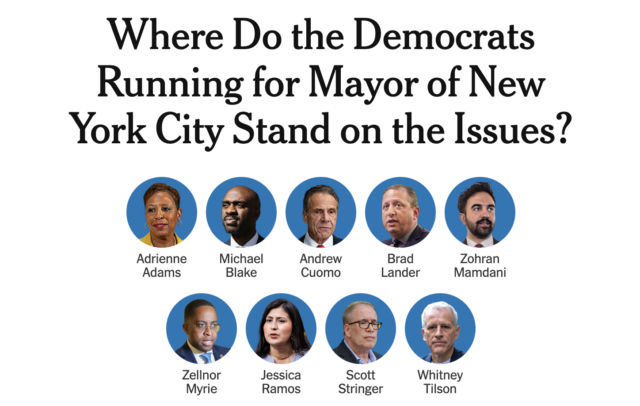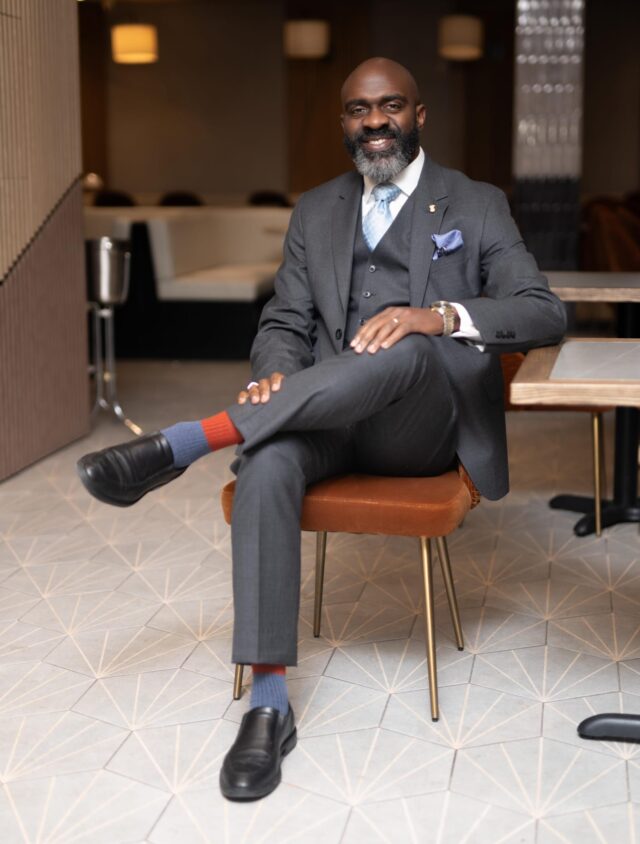The New York Times sent a wide-ranging survey to leading candidates for mayor about affordability, public safety, President Trump, homelessness, congestion pricing, immigration, schools and their one big idea.
By Emma G. Fitzimmons | April 20, 2025 | Read the Full Article Here
Excerpts below include the responses from Michael Blake.
This year’s race for New York City mayor has been anything but predictable.
Mayor Eric Adams, the incumbent Democrat, has seen his political fortunes decline so sharply that he is no longer competing in the Democratic primary, set for June 24. Instead, he will run as an independent in the general election in November.
Nine other major candidates are vying to win the Democratic primary, which, in New York, typically decides who will become mayor.
This year, the general election promises to hold a bit more intrigue, with the Democratic victor likely to face Mr. Adams; Curtis Sliwa, a Republican; and Jim Walden, an independent. The Working Families Party may also put a left-leaning candidate on its ballot line.
The New York Times asked the leading Democrats in the race to answer a list of policy questions, and their answers are below. Responses were edited for length and clarity.
Affordability
New York City is facing an affordability crisis that has forced many families to leave the city. Rents have soared, and there are simply not enough affordable homes.
What are two specific policies you would enact in your first year to address the city’s affordability crisis?
We will implement a “local median income” standard for affordable housing, eliminate the use of credit scores for rent and mortgage applications, build Mitchell Lama 2.0 housing and implement universal child care, among other ideas.
Public Safety
Overall crime is down in the city and homicides have fallen, but the number of felony assaults has risen and crime has not returned to prepandemic levels.
How would you improve public safety?
We will hire more officers for community policing with body cameras on for accountability and work with Albany to hold repeat offenders accountable, as we reduce the overall budget by addressing excessive overtime and the Strategic Response Group. We will have mental health professionals addressing the crisis on subways and in our streets, while increasing walking street patrol for officers.
Trump
Many New Yorkers are worried about how President Trump’s policies could affect the city, especially federal funding cuts and mass deportations. Some residents support his policies on immigration and public safety.
How would you approach the Trump administration, and what is your greatest concern about his second term and one area where you hope to find common ground?
I will check this bully and his unconstitutional attacks. We reject the administration’s hate and divisive actions. If Trump cuts our funding and services, we will withhold tax dollars from the federal government. We could possibly find common ground on improving our infrastructure.
Homelessness
The number of people living in the streets and the subway system has risen to the highest level in nearly two decades. More than 4,100 people were unsheltered last year. Some homeless people struggling with mental illness have been involved in violent episodes that have contributed to anxiety over public safety.
How would you address street homelessness for people with severe mental illness?
My family overcame homelessness in Jamaica, so it’s personal how we address this challenge. Street homelessness and severe mental illness require compassionate, clinical solutions, not criminalization. We’ll expand mobile care teams, increase overdose prevention centers, secure more funding from opioid settlements and establish permanent supportive housing.
Congestion Pricing
Congestion pricing began in Manhattan in January, and the tolling program has successfully reduced traffic and raised revenue for the transit system. President Trump has argued that the tolls are too expensive and vowed to kill the program.
Do you support congestion pricing?
I support the intent of congestion pricing to reduce traffic, improve our environment and lower emissions. But we must lower the cost for New Yorkers.
Immigration
More than 200,000 undocumented immigrants have arrived in the city since 2022. New York City has so-called sanctuary city laws that limit cooperation with federal immigration authorities. Mayor Adams wants to change the laws to make it easier to work with federal officials; Democrats in the City Council have refused to alter them.
Should New York City keep its current sanctuary laws or would you revisit them?
As a son of Jamaican immigrants from a union family, the city will keep and strengthen its sanctuary status while embracing diversity and holding people accountable. I will not allow ICE in schools, churches, or clinics. I support codifying these protections into city law.
Schools
The city created free universal prekindergarten for 4-year-olds in 2014 and vowed to expand it to all 3-year-olds. But Mayor Adams has made preschool budget cuts and there are not enough 3-K seats in some neighborhoods.
Do you support the expansion of free 3-K to make it universal?
As a public school K-12 graduate, I support expanding 3-K into full, universal child care, from birth through age five. Child care is essential, not a privilege.
Big Idea
Mayoral candidates often highlight one major policy idea that could improve life in the city. In 2013, Bill de Blasio ran on creating universal prekindergarten, which he quickly implemented. In 2021, Eric Adams ran on approving tax credits for poor people and creating a new website to apply for benefits.
What’s your one big idea — your most important campaign proposal?
If the federal government cuts services to New York, we will withhold the equivalent in New York City tax dollars, dollar for dollar. We won’t have taxation without representation. We also need to stop using credit scores for rent and homeownership applications as it is a major reason why so many communities of color are unable to realize a dream of an affordable home.




